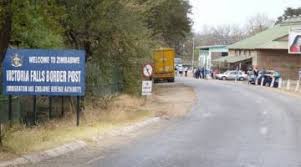By Nokuthaba Dlamini
The closure of borders to stop the spread of Covid-19 has not stopped smuggling activities along Zimbabwe’s border with Zambia amid claims security forces are aiding the illegal activities.
Zimbabwe shut down its borders for ordinary travellers in March as Covid-19 cases started rising.
Only commercial traffic and returning residents are being allowed through the borders.
The restrictions, however, have not dented the operations of smuggling syndicates, who use several illegal entry points along the Zambezi River to sneak into Zambia.
They use boats to sail to the neighbouring country and touts are making roaring business facilitating the movement of contraband.
Security forces deployed to stop the illegal movement of goods are said to be cashing in on the increase traffic along the clandestine entry points.
Some of the most common contraband being moved across the Zambezi River in the midst of the lockdown include alcohol, skin lightening screams and groceries.
Chris Shumba* from Victoria Falls said he joined one of the smuggling syndicates operating on the outskirts of the resort town by chance.
“I was fishing at a river in Chisuma in June when l saw a group of people walking towards the gorges and upon inquiry l was told they were going to Zambia to buy skin bleaching creams and alcohol,” Shoko said.
“I followed them and down the river we found two men waiting for the group.
“They quickly boarded makeshift boats known as muguro and they sailed off to Zambia.”
He said he was immediately enticed to join the syndicate by one of the men at the gorge, who boasted about the huge monies they were making smuggling goods into Zimbabwe.
Shoko said once on the Zambian side of the Zambezi River, the smugglers are transported to Livingstone town by waiting taxis.
They spend the whole day in Livingstone doing their shopping and return to the illegal entry point around 9PM to evade joint patrols by soldiers and police officers.
“I fell in love with the business on the first attempt,” he boasted.
“Some of the people l was with on that trip said they had travelled from as far as Gweru.”
Senzile Ncube*, who started by smuggling skin lightening creams and illicit alcohol brews, said she had now added hair products and groceries into her merchandise because business was booming.
“We pay US$2 per trip to the Mugoro operators, who are always sailing on the Zambezi River whether its during the day or at night,” Ncube said.
“On the Zimbabwean side a usual trip starts with a journey by commuter omnibuses from the Chisuma business centre and the crossing point is five kilometres away.”
The five kilometre trip costs US$20.
On arrival they are assisted by touts, popularly known as omanyamula, to find the best crossing points and they pay US$ for the service.
“Crossing the river is dangerous as the water is infested with crocodiles and hippos, but we have no choice,” Ncube said.
At times the smugglers are intercepted by state security agents on both sides of the border and are forced to pay bribes to evade arrest.
“At times we come across soldiers, police or (Zimbabwe Revenue Authority) Zimra security officers, but we know how to handle them since we now know them very well,” Ncube said.
“The bribes depend on the type of contraband and it can be as much as US$10 per person.”
Some of the smuggled goods are openly sold at markets and tuckshops in Victoria Falls.
Smugglers say the bulk of the goods would be destined to different parts of the country amid suspicion transporters bribe police officers manning the highways for a safe passage.
At the height of the Covid-19 lockdown, the government made heavy deployments of armed police and soldiers to restrict the movement of people.
Investigations, however, revealed that smugglers still moved without any hurdles on the Bulawayo-Victoria Falls highway.
On October 4 during the course of this investigation, this reporter stumbled on an 18 seater commuter omnibus that had just been involved in a road accident near Hwange town.
Boxes of different whiskies and hair products were strewn all over the accident scene.
The driver said he was hired by different people in Bulawayo to transport the goods that were imported from Zambia via Chisuma.
He did not wait for police to attend to the accident and loaded some of the goods into a Bulawayo bound long distance bus.
Some of the passengers helped themselves to the alcohol.
A check with Matabeleland North police revealed that there was no record of the road accident.
“Usually when the illegal transporters get involved in accidents they give away the goods to people around the area and tow away their cars as a cover-up,” Matabeleland North police spokesperson Chief Inspector Siphiwe Makonese said.
“So this is what might have happened with that accident.
“It is not in our records.
“We shall investigate those officers, who assist smugglers to cross the river with illegal goods like in the case of the kombi driver involved in the accident you referred to.”
Zimra national spokesperson Francis Chimhanda confirmed that smuggling along the Zambezi River was rife even during the Covid-19 lockdown.
Chimhanda said some of the most smuggled goods included skin lightening creams, used and new clothing and alcoholic beverages, mainly cheap spirits and whiskies.
“Indeed there have been cases of smuggling reported since the beginning of the lockdown,” he said.
“In Victoria Falls, we are dealing with smuggling cases every month.
“Smuggling remains a challenge that the authority continues to fight on a daily basis.”
Chimhanda said some of the smuggled goods have been intercepted, and offenders taken to court.
Smuggling is also rampant along Zimbabwe’s porous borders with Botswana, Mozambique and South Africa.
The vice has been blamed on corruption among security forces deployed to police the borders and lack of resources to monitor movements of smuggling syndicates.
*Not their real names

